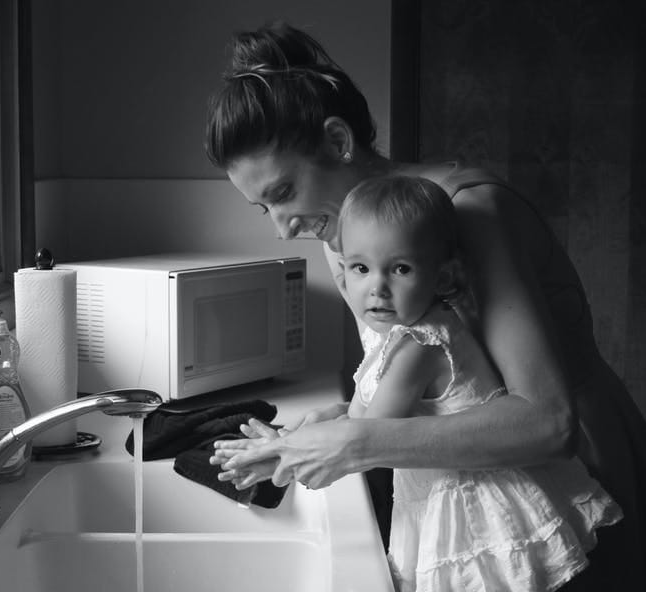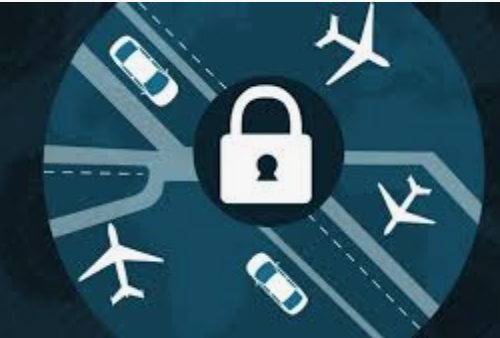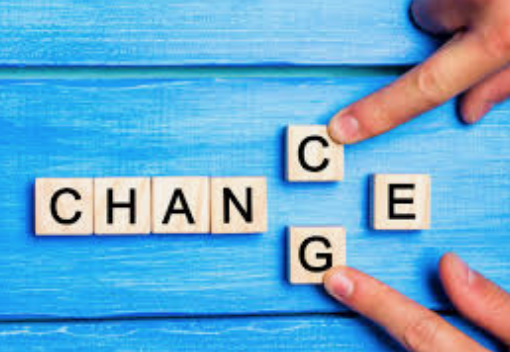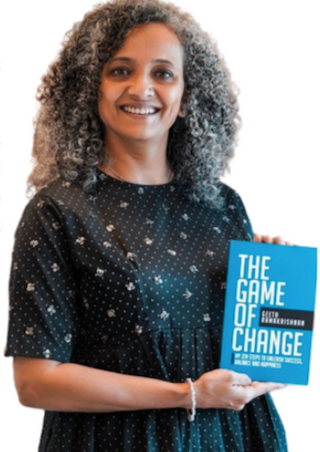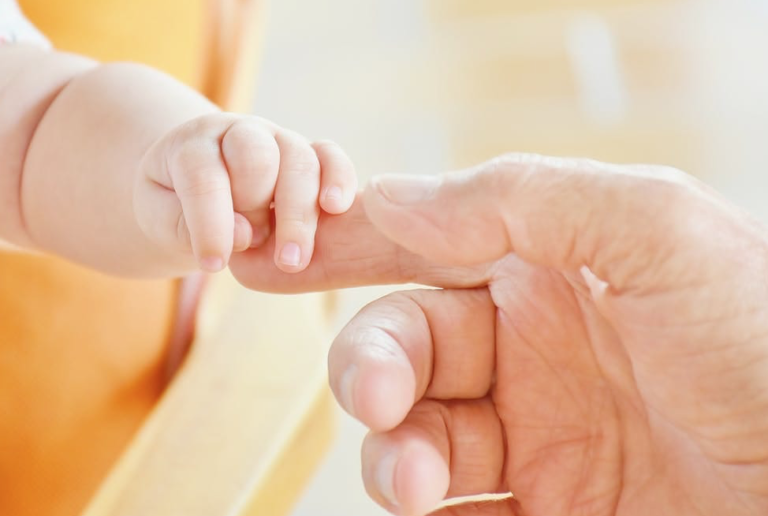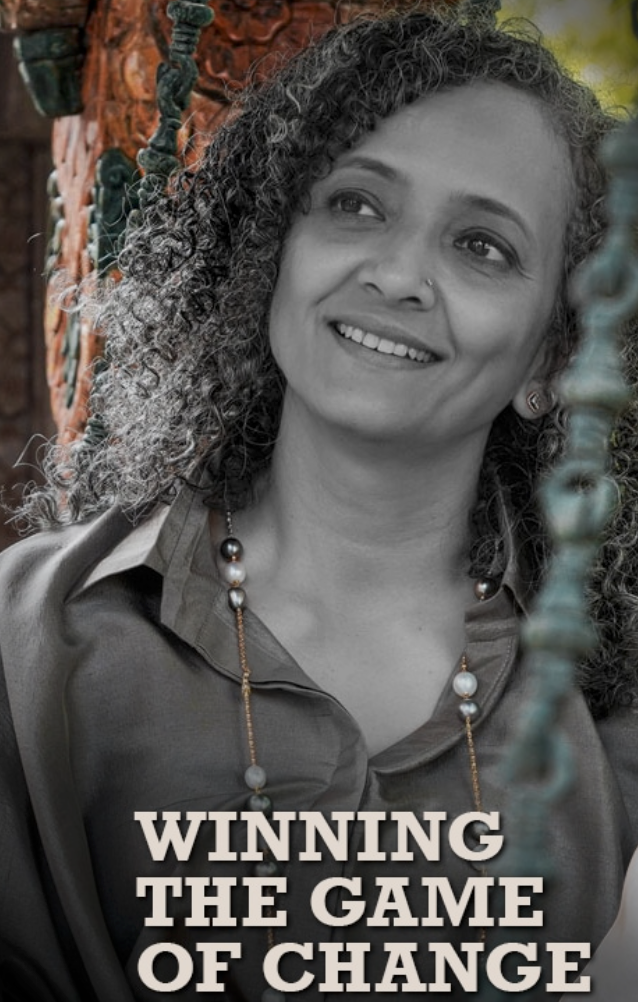Nurturing ChildrenOur children are a gift from God and we are here to provide them a fertile learning field for them make grounded perceptions to thrive in this world. One of the skills you can help them with is values creation, as it forms a solid base for their survival skills in life. While you may not be successful by forcing values and expecting them to follow, an easy way it to involve them in co-creating family values. Maybe family discussion and listing values is a good first step. Values like honesty, compassion, hard-work, respect and kindness to name a few. Make it real and relatable as children learn by seeing you living those values. Values form a strong root to help nurture your children into confident young adults, ready and enthusiastic to take on this world to succeed in their dreams their aspirations and whatever they want to do in life
Zen Success
7 Tips to Ace Your Exam
My article from Femina
Expert Speak: 7 Practices You Never Knew Could Enhance Exam Performance
A question that probably lingers in the mind of every student is, “How do I become perfect in exam preparation?” The answer to this question is like an asymptotic to a curve – you cannot exactly reach it, but you can get close to it. To ace your exams, you need to perfect your preparation techniques.
Treat studying like a 9-5 job, so when you unwind in the evening, you won’t feel guilty. Also, by implementing a routine, you will teach yourself that during these hours you must be doing things relevant to your studies like revising for an exam, doing the required reading or working on assignments/projects. Give yourself an hour’s lunch break like at a workday and then at 5 pm you can wrap up. This can also help reinforce a healthy sleeping pattern which will improve your memory.
When you understand a concept, memorisation follows naturally. Try to understand the core of what you’re learning and build upon that, versus memorising for each test and forgetting afterwards. This will also help you master your final exams!
For those moments when you can’t conceivably have your nose stuck in a book – while you’re walking, driving, exercising, folding laundry – considering listening to a recording that complements your studying. Whether you have recordings of your professor’s lectures, found a podcast on the topic, or taped yourself reading over your notes, plug in your earbuds and listen up. This is especially helpful for auditory learners who do best when they hear (and not read!) information.
Now, this tip might only work for particular subjects, as not every subject or degree has pragmatic answers in exams and coursework. However, for instances where you and your course mates have all had to read or memorise information for an exam – get together and have a quiz night. Create a set of relevant questions and answers, get into teams and quiz each other. Hopefully, the competitive streak will help you remember information and also have fun.
It could be chocolate, 10 minutes of social media or television or maybe a nap, the choice is yours. When you have something to look forward to, you’ll tend to be more dedicated to finishing that task. No cheating, though.
Within 12 to 24 hours of the test, it’s time to stop studying. You’re not going to learn a lot of new content. The likelihood is much higher that you’re going to stress yourself out and confuse yourself. For the last-minute studier, flashcards can be a good resource. They can earn you a few more points on test day, and it’s a much healthier thing to do than starting on page one of the textbook.
t cannot be stressed enough how important this factor is. If you eat heavy, unhealthy foods late at night, your brain isn’t going to be in prime form. As such, it’s especially important to factor food into your study routine! Fruits and nuts are particularly good choices during munch time. And fuel goes beyond what you’re putting in your mouth: Getting enough quality sleep and taking some time to recharge is also super important. After all, what’s good for the body is good for the mind.
In conclusion, one simple fact that students tend to forget is that relaxation is not a luxury. It is a necessity, especially while preparing for examinations or your brain will be in a daze. Studying can be mentally exhausting, and if you don’t give your brain some rest, it will burn out. But relaxation should not become procrastination. Ensure that relax enough to re-energise your brain.
Blog: 38/52 Parent Energy
As parents we want our best for our children and rightly so. We want them to learn from our mistakes and do better in life. In this process we super impose our dreams and unfulfilled wishes on them. Instead of giving them wings to fly, we crush their dreams and their creativity. We constantly hand hold them by not allowing them to make their own mistakes. In the process, they may lose their self-esteem and confidence. Unless they go through their own learning curve and their struggle, how will they organically learn to become good human beings? The road may not be easy but that is what makes them tough and confident young adults who believe in themselves and their dreams. We do not own our children. Our children come in this world with equal potential to learn survival skills and thrive and create their own dreams and future.
5 Ways to Tackle Lockdown
My article from Medium.com
The prolonged lockdown has added to our stress, anxiety, and chaos. While the pandemic is a serious threat, all of us need to start learning to live all over again. When our brain in a constant state of panic, it shuts down rather than help us with a tangible solution. In my latest article for Medium, I list some possible ways to better manage these situations and help us tackle our mental health issues caused by the virus.
How we live our lives has dramatically changed over the last few months making it difficult to cope with this unprecedented change. The prolonged lockdown has added to our stress, anxiety, and chaos. We have to start learning to live all over again. When our brain in a constant state of panic, it shuts down rather than help us with a tangible solution. Here are some possible ways to better manage these situations.
1. Start your day with a Positive Mood.
The uncertainty in business economics is effecting the job stability and income resource itself. At these times you can worry incessantly, complain about your boss, your situation, about COVID with no use. On the other hand, you can spend just 5 minutes of your morning time focusing on deliberate slow breathing, on being thankful for the things you still have, the people around who still love you, this allows your day to start with a positive mood. And the way you start your day has an impact on how you think and behave for the rest of the day.
2. Add lightness to WFH routine.
Work from home has worn out its novelty. The stress of handling extended work hours and house chores, with no house help, and also managing children, there has been thrown on you with no time to even think. Especially working couples not used to so much together time end up quarreling rather than partnering. Try using this opportunity to take time out for conversations, acknowledging each other’s stress level, keeping separate workspace with common work time, adding late-night home movie dates. It cannot change the situation but can add lightness to the situation.
3. Co-Create a Family Work-Play Schedule.
Managing and engaging young children and teens alike is a task. They need to expend their energy. Being enclosed in a small space does not offer an effective outlet. What helps is sitting as a family and co-creating a timetable to include study, play, food, and sleep-time. Ask how the children can help with the housework. Family games are fun ways to bond. It may be a bit more time and energy consuming but well worth the results.
4. Staying Healthy.
In-between this chaos, staying healthy takes a beating. Living in stress and fear leads to decreased immunity. Add half an hour of yoga or cardio exercises like skipping or jumping jacks to your morning routine. A couple or family workout makes it more fun. Try out healthy recipes, and plating it artistically makes it interesting as well. A healthy lifestyle adds to increased immunity.
5. Reach Out for Help.
One thing that gets effected during the lockdown , with restricted movements, enclosed space and limited or sometimes no social contact can have a negative effect on your mental health. If you feel low, lack of motivation, even mildly depressed, reach out and ask for help. Reach out to a family member, friend, or seek a medical opinion. Asking for help is a sign of strength, in acceptance to be flexible and open to change.
COVID and Change
At a time when the world is gripped by the pandemic, there is a great need to master all our fears and bring out the best in ourselves. My book, The Game Of Change is designed for the very same purpose, and allows us to lead our best life, learning to continuously recalibrate our goals and evolve with confidence, as things and events around us change, which is infact needed now more than ever.
To buy the book online, head to this link: https://www.amazon.in/Game-Change-Unleash…/dp/B07FWMPTM5
Here is the link to the audiobook:https://www.amazon.com/Game-Change-Unleash…/dp/B07JNRD1XQ
Why Coaching
My story from Impact Magazine Sept 2020 issue…
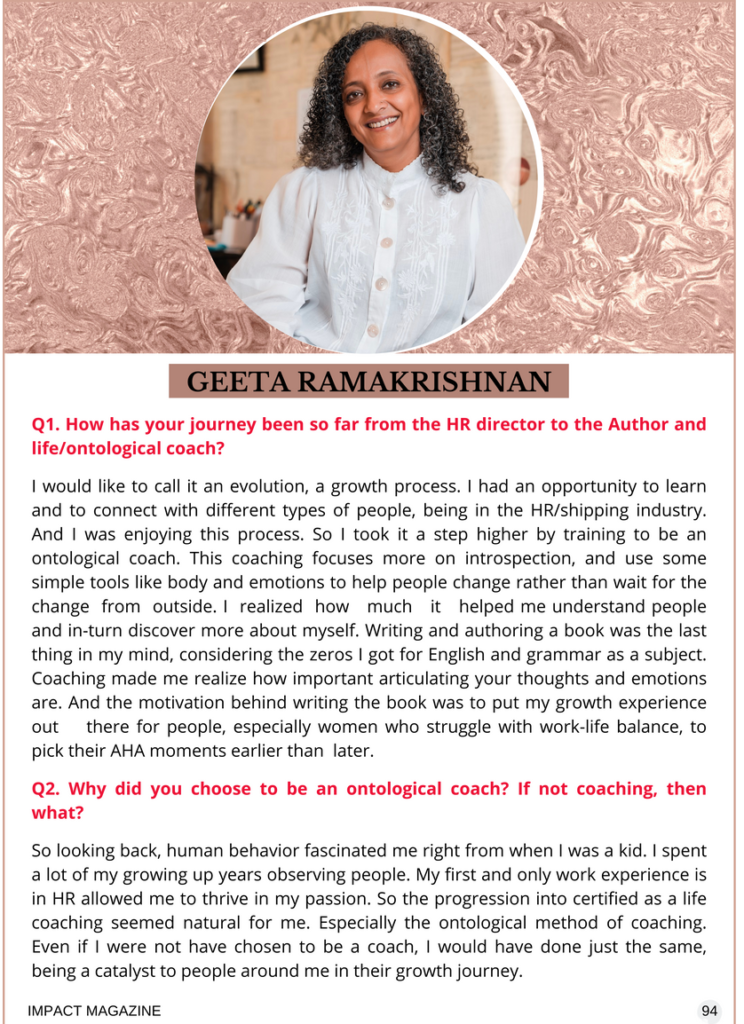
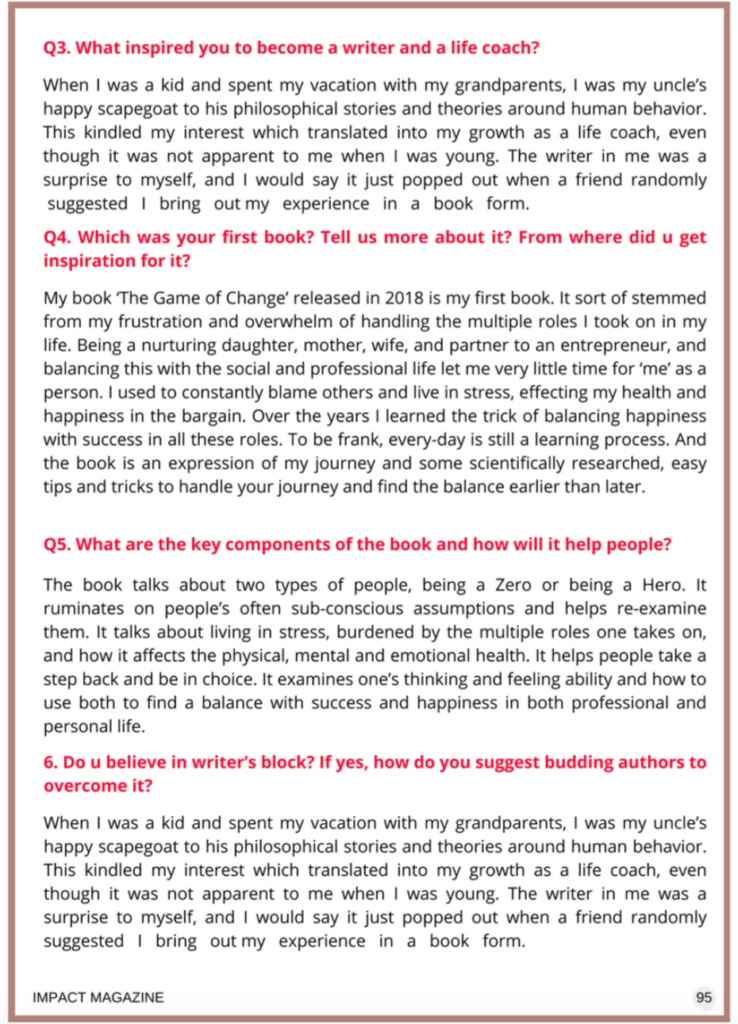
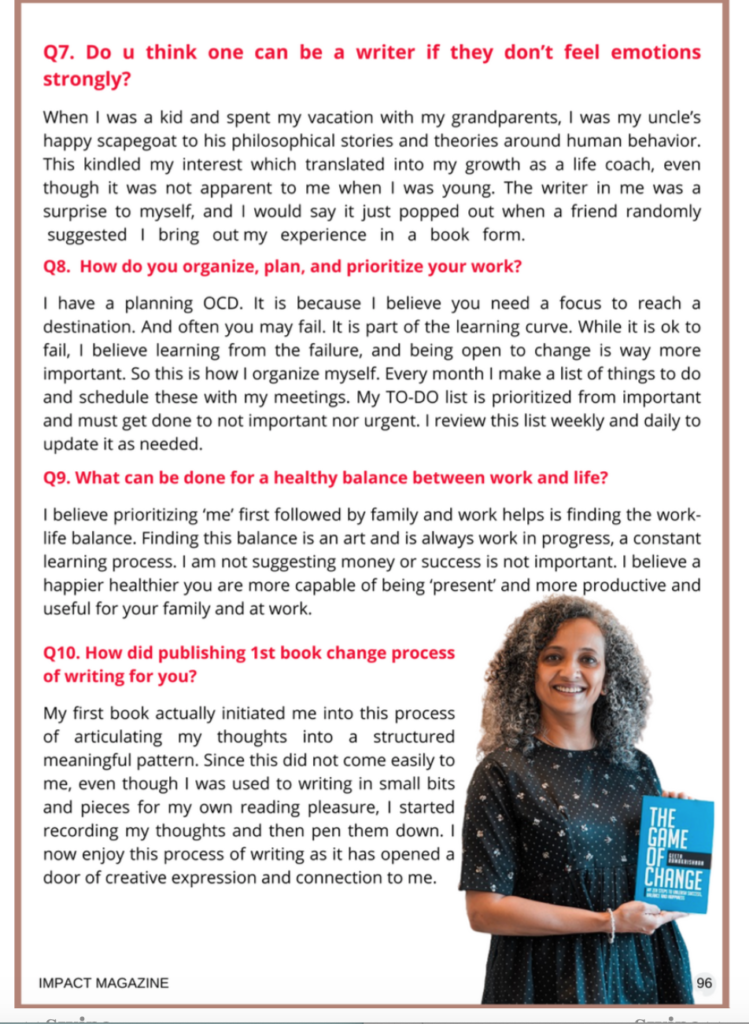
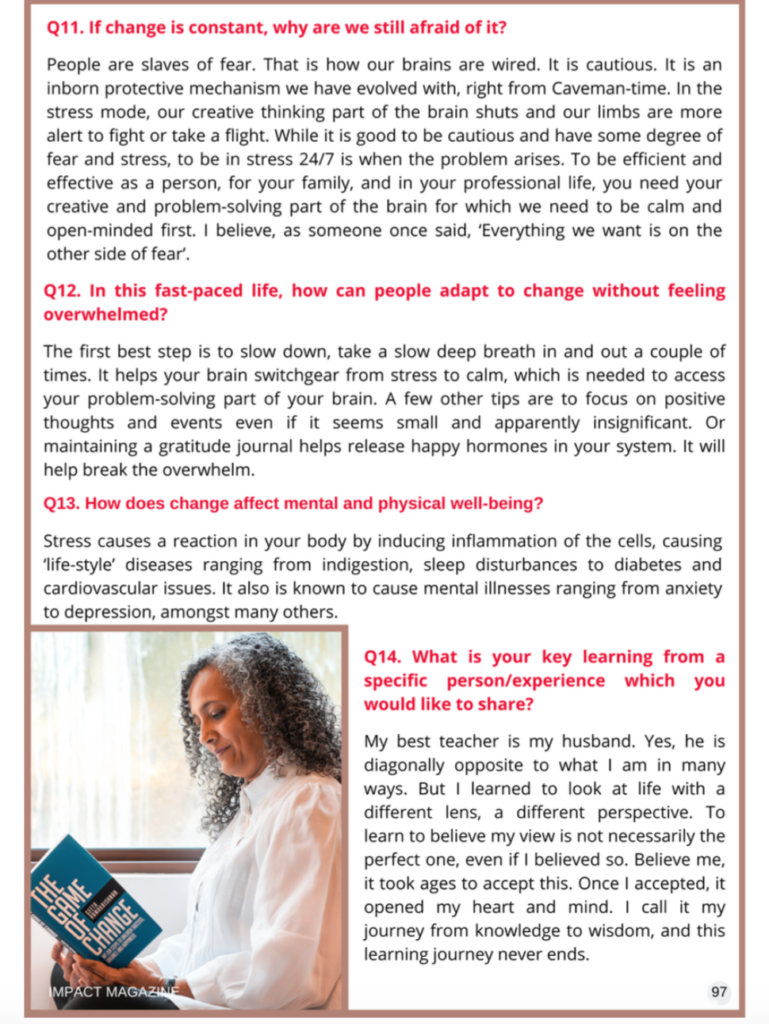
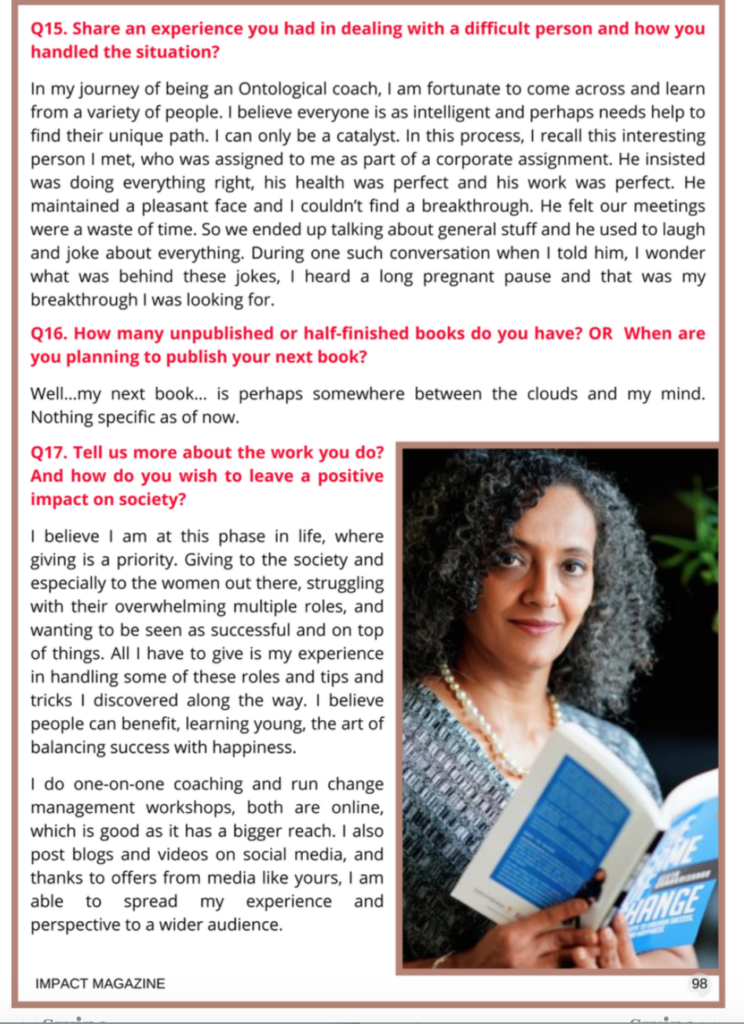
Blog 36/52: Best Parent
Blog 36/52
How to be the Best Parent
Weddell Seals with a 11 month pregnancy, can single handedly raise their children, teaching them to hunt in the icy water and survive the tricky icy landscape before letting them go to fend for themselves. Orangutans who can get pregnant once every nine years, are also single parents, nurturing their little one for a full eight years, getting them ready with all the survival skills needed and they are ready to be on their own. Male flamingos practice gender equality and coparent till the little ones are strong enough to fly away.
While humans are said to possess more cognitive and emotional abilities than other animals, we unfortunately cannot bag the ‘Best Parent’ award in the animal kingdom. We unwittingly pass our fear and anxiety to our children which works against them thriving in this world. Our inability to let-go of our children when it is time and allow them to learn from their mistakes is another factor that works against making us the best parent despite possessing the best brain in the animal kingdom.
Interview @Precedence
In this unfeigned interview with Precedence Magazine @tprecedence , I shed light on the many aspects of ontological coaching in the modern world, while discussing the current global situation and how to deal with the various deep rooted issues and life altering changes that they present. I also speak about my beautiful journey into my profession, which has enabled me to help so many people and understand life on a deeper level. Ontological coaching gives me immense satisfaction of being a catalyst in people’s success stories while teaching me to stay grounded and expand my perception of life with every conversation. It was a true pleasure to recall my journey and help people introspect during these unprecedented times.My book the Game Of Change offers numerous such insights to help change one’s life for the better, and to reach for all your goals while undergoing a sea of positive transformation. Here is the link to buy the book on amazon: https://www.amazon.in/dp/B07FWMPTM5/ref=cm_sw_r_cp_apa_fAKtFbR92JB0K
Winning the game of change
Ms. Geeta Ramakrishnan, Ontological Coach, and Author
“Coaching in itself, like counseling and other mental health practice is still a taboo in our part of the world. Having said that, there is an increasing level of acceptance, thanks to media spreading such awareness in a positive light.” – Says Ms. Geeta Ramakrishnan, Ontological Coach, and Author.
Team Precedence got an opportunity to connect with Geeta Ramakrishnan, to understand the concept of Ontological Coaching and her journey as a life coach and author.
Situation(COVID-19) for which no one was prepared to deal with, what was your initial response to it, and how did you plan to deal with it personally?
Reading about COVID in China around the beginning of the year was like passing news. It hardly kindled any interest. My husband and I were traveling from Europe around February when we noticed a distressed fellow passenger discuss the spreading of COVID-19 in Europe. Now that raised an alarm but I still believed I was far away and safe. As the virus spread rapidly all around the world like wildfire, I was in disbelief, maybe denial and in shock. Not many in our lifetime would have thought of or witnessed a viral pandemic. The talk in my head went like: I am not going to wear a mask and walk around and this must be some media sponsored news and will soon pass. There was a lack of clarity, lack of information added to a lack of any known treatment for this deadly killer virus. As reality struck, I gathered myself and decided the best way to deal with the virus was to follow the government rules and regulations and not analyze if it was right or wrong. I followed social distancing norms, stayed indoor during the lockdown, wearing the mask, and sanitizing my hands as needed and was working from home. This was a much needed, though sudden, break in the speed at which we blindly pursue life. It made me slow down and I started to enjoy and appreciate the small pleasures in life. I realized once you accept the situation, however negative it may seem, things become less fearful and less stressed. The best bonus for me was the family bonding time. I discovered I had more time in hand and started cooking more than I would have, reading some more and even found time to hone my art and craft skills.
Ontological Coaching is not well known among the people in India, Please share more about it and the whole process?
Coaching in itself, like counseling and other mental health practice is still a taboo in our part of the world. Having said that, there is an increasing level of acceptance, thanks to media spreading such awareness in a positive light. Today many corporates are open to partnering with life coaches to enhance and expand the creative thinking ability of their top high-end performers.
Ontological coaching broadly translates to a philosophical way of introspective coaching. It is a form of life coaching that works on the way you think, feel, and behave, thereby allowing you an opportunity to be a better version of yourself in whatever you wish to pursue. It works holistically and says you wish to sharpen your professional skills, it automatically takes care and deals with the other aspects of your personal life, family relationship, social skills as a whole. If you have a problem at work or home, getting a counsel may solve that particular issue, but may not resolve the root of the problem. In the ontological way of coaching, the coach partners with you in the driver’s seat. With reflective questioning techniques, maybe you may realize your problem lies elsewhere and you have to sort that issue first. This process helps you contemplate more deeply about how you perceive the world and the people around you. In this process, you become more aware and are in the choice of your next best step, irrespective of or despite a situation. You learn to transform resentment, rejection, and failure into acceptance and learning opportunities. I believe growth happens when you learn to face your fear. This process empowers you to be a master of your choice, supports your personal and professional growth alike, allowing you to balance life with success and happiness.
What was the motivation or turning point that led you to Singapore for an ontological coach training program? How was the journey of discovering yourself?
I am keenly interested in human behavior, philosophy, and self-discovery from a young age and used to spend hours listening to and reading related books. As a woman trying to juggle multiple roles in my professional and personal life, I wanted to be seen as being successful in all of them. Handling all these roles successfully did not come easily to me. I lived in resentment and stress for years, not knowing how to come out of it. It affected my health and that was my turning point when I said enough and took a pause. I understood the power of letting go, to embrace my imperfection, and to learn from mistakes to help strike the balance to success and happiness. And for me, this learning in self-discovery never stops. Having spent my working years in the people’s department, I wanted to challenge myself to take my learning to the next step. When a friend of mine suggested the course in Ontological coach training, it sounded a perfect fit. It required a couple of contact workshops in Singapore, online classes with competencies training, group participation, monitored and mentored coaching, an exam, and some coaching hours to get a professional certification. Ontological coaching gives me immense satisfaction of being a catalyst in people’s success stories while helping me stay grounded and expand my perception of life with every conversation.
Increasing stress and mental health concerns pandemic has impacted people across the globe, what is your perception or process to keep self-healthy?
We live a life where stress and anxiety are taken as a normal day to day part of living. The COVID-19 pandemic has changed how we think, feel, and live our lives. We have to face lockdowns, social distancing, and work from home with the fear of losing jobs, with declining economies impacting all of us. A little bit of stress is always good as it helps us be careful during this pandemic. But living in fear puts our brains in a constant fight or flight mode. Instead of facing life and its challenges in a positive and meaningful way, the thinking and problem-solving part of our brains shut down. Instead of finding a better solution, we start getting anxious, irritated, and frustrated. This fear and anxiety will not only negatively impact how we handle this situation, but it also negatively affects our immunity and health, making us more vulnerable to diseases. Coping with the new way of living in social isolation is an added threat to our mental health.
While we do not have control over the pandemic itself, we do have control over the way we react to it. Try looking at the bright side, however insignificant it may seem at first. COVID-19 has forcefully slowed down our pace of life. You will notice working from a slower pace does not necessarily give poor results. Work from home can offer more family bonding time, time to discover your hidden talents perhaps, discover new ways of e-working efficiently to name a few. Notice how slowing down makes you breathe deeper, which in itself has a calming effect on your brain. It is this calm brain that gives you a Zen creative thinking space needed to deal with life-threatening issues, helping us balance a happy and healthy life as possible.
Pandemic has changed how we have been pursuing our careers, especially when people work from home they tend to pull negative impacts on personal life, how do you keep a balance?
Work from home used to be a wow thing, only offered by some cool companies to chosen employees. And suddenly, without warning, it has become the way of working, a new normal that has been thrown at us without a choice. It calls for a lot of changes in the way we look at and do things. Thoughts like ‘How will I juggle work timing with double the housework now’, ‘How does one conduct a serious online video meeting with the children screaming in the background’?
The thing about fear and anxiety is, the brain likes to dwell in these negative thoughts, playing them in loops, blowing them out of proportion, and pulling you down in the process, with no offer of a useful solution in line. This can make you an annoying parent to your children or a short-tempered person in your family, an irritable person at work. None of this is good for your confidence or your health, adding to your frustration.
Since you can do nothing to change the COVID situation, what you can do is to make small changes in the way to do things. Start by demarcating your boundaries. Choose a corner of the house you like and make it your workplace.
You can help create the same for your children. Stick to and differentiate office timings and home timings. Plan and devote your home time to family games or housework or some ‘me’ time like watching a movie perhaps. It brings some structure into your life and this familiarity and order bring a sense of calm to your mind. It helps you face your life much better and with confidence. Accepting, articulating, and sharing your emotions like fear, anger or frustration is a great way of letting out steam from your stressed brain and supports your mental wellness.
Similarly, schools have shut down and parents are feeling overwhelmed with kid’s responsibilities, please suggest how parents can contain their energies?
This is a tough one, managing the bubbling children’s energy. They are curious and love to test your limits. And now you have to also partner with the teacher in ensuring and disciplining younger children to get ready and sit in one place and follow the school work schedule. Often splitting the work with your partner makes it better manageable. Also co-creating the study timing with your children by including and involving them so they share the responsibility while adding some playtime, family time and house chores allow more participation and help build their confidence. A family cooking and family games are great fun ways to bond, an opportunity that was not available per COVID-19.
Job losses, pay cuts & uncertain times bringing people to new lows, what will be your best suggestion to deal with such conditions?
As I said, we may not be able to change the pandemic but we can change our attitude, our approach to the way we handle this challenge, in a positive, open, and constructive, creative way. For this change, we need our brains in a calm state which seems impossible to achieve as we are used to meeting challenges with stress. Imagining you are about to lose your job and you have your EMIs to pay, your children’s fee to be paid, how can you not be stressed? Whatever good words one offers you as a friend will go into a deaf ear.
Just taking a conscious deep slow breath in, and breathing out even more slowly, is an easy brain hack to steer our brain to a calmer state. This does not come easy, like anything good in life does not come easy. It needs a lot of practice. Our brain is used to focusing on a problem to solve it. A habit that probably even worked at times. But it leaves you in a state of constant stress. Now instead of focusing on the problem, focus on your breath. 3 to 4 slow breaths involve 2 to 3 minutes of your time. Be mindful and definitive about it. This 2 minute is all it takes for your brain to switch to a calmer state that is equipped to help you creatively face challenges, face failure with a learning, open and flexible attitude. It offers you an attitude of emotional resilience.
What matters more, a well-paid job or a quality life, especially in developing countries like ours, target better-paid jobs even if they had to work hours not acceptable for a healthy lifestyle, do you see a way to find the right path or balance?
If you target happiness as your core choice, then the peace of mind, good family life, good work-life balance takes priority where money and success can also be an outcome. On the other hand, if you target money and professional success, it has been known to come with a compromise on health, with lopsided work-life balance at the cost of happiness. And traditionally we have been unwittingly conditioned to focus on money and success, which comes at the cause of a life of stress. Living in stress 24/7 causes our cells to be inflamed, negatively impacting our immunity. It causes lifestyle diseases ranging from indigestion, food intolerances, PCOD to diabetes, and cardiovascular diseases.
All of us aspire for an upgrade in our life-style, the art is in the balance to ensure and be mindful of keeping the focus on a wholesome lifestyle. To achieve this healthy work-life balance is needed. When you prioritize ‘me’ first followed by your family and then your professional life, you can enrich your physical, mental, and emotional wellbeing which makes you a better nurturer for your family and transforms you into a strong and confident person, optimizing your professional potential.
In today’s demanding world, women are handling multiple and complex roles and balancing both work and personal lives, according to you, how can they find that balance to keep their inner happiness alive?
Juggling and balancing life is a challenging act, as I learned through my experience to understand this art. We, women, juggle more than men, being naturally oriented to nurturing and being exposed to and grabbing the equal opportunity available. We want to be seen as strong and give more than our 100%, often critical of our work. Instead of making us confident, it takes a big toll on our health and confidence.
Once we accept that we don’t have to prove to anyone, least of all ourselves, and learn to embrace our imperfection, be ready to make mistakes and not shy away from learning from them, it forms a great formula to help with our balance.
Take time to create a purpose in life, make some goals that work toward it, added with some time management skills where the focus is first on things that are important and urgent. If dropping your child to school is important and urgent, then plan your office meeting accordingly. Or outsource the school pick up and drop. It is all about choices. Once you learn to incorporate your choices into your daily life, with weekly reviews, you can easily attain your goals, be it personal, family, or professional. Nothing can give you more happiness than achieving your goals, the way you see it.
You have made an unconventional but an interesting career choice to provide helping hand to others, what will be your message or suggestion to the young people who wish to take a similar path.
My interest and focus have always been to study philosophy, human behavior, and intersperse it with my personal experience in facing my fear and finding the balance. The career of being an ontological coach goes well with my purpose and goal in life, to give and to learn and grow in that process.
While ontological coaching may sound philosophical, it is based on scientifically researched and verifiable facts. Ontological coaching is accepted by the international coaching federation and one can become a certified coach following their high standards of coaching ethics and guidelines, and work based on their recommended competencies. What makes this coaching distinct is its ability to help clients introspect and challenge their way of thinking and feeling. It helps them redefine their perspective. This coaching offers the flexibility to seamlessly connect their personal and professional life as needed.
As a career path for a certified coach, if you are curious and have an open-minded attitude, inclined to learn, to do something meaningful in life, this is a satisfying profession of giving and nurturing. Being a certified coach is an asset in the corporate world. You can sign yearly contracts with companies for one on one and group training workshops and coaching assignments. You also get to choose and engage with individual clients for a couple of coaching sessions, earning by the hour. You get the opportunity to have interesting conversations from people in many walks of life, be it a stressed homemaker, a person looking for career growth, or a person stuck in life or someone who is just curious and fishing around. It is a great opportunity to extend your learning in a way that is useful to others and offers you some interesting take away as well. In that case, you have a solid career or another career plan, going through the ontological coach training program in itself is an eye-opening life change experience, as it was for me.
In the present times, where people around the globe are going through many emotions at once and the pressure of multitasking is real, ontological coaching can help us to deal with such confusing situations. People like Geeta Ramakrishnan are continuously putting their efforts into making this happen.


